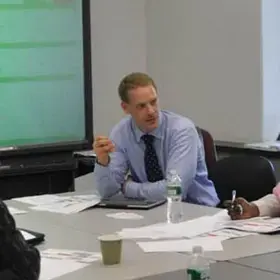Mark Whitlock, Ph.D.
Lecturer, Negotiation and Conflict Resolution
Dr. Mark Whitlock is a lecturer in Columbia University's Negotiation and Conflict Resolution (NECR) program where he teaches in the Capstone Thesis seminars. Dr. Whitlock is a Political Scientist working within the subfields of International Relations (IR) and Comparative Politics. Leveraging insights from political and evolutionary psychology, his work examines the analysis and prevention of identity-based political violence writ large, its causes and consequences, and emphasizes foreign policy decision-making in operational early warning and response (EWR).
His mixed-method research has specifically interrogated:
- The development of risk mitigation and crisis forecasting in international affairs;
- The noted warning/response gap in international conflict prevention;
- Conceptualization and measurement of political will, its determinants, and role as an explanatory variable for state behavior in foreign policy production;
- The production and prevention of mass atrocities/mass killing from antiquity to the present (19th C. late-modern era).
Dr. Whitlock has conducted research and consulted on the development of regional conflict early warning architectures in Africa, Europe, and Asia with international organizations and regional economic communities including The Economic Community of West African States (ECOWAS), the Intergovernmental Authority on Development (IGAD), the African Union (AU), UN Office for West Africa and the Sahel (UNOWAS), the Organization for Security and Co-operation in Europe (OSCE), the Association of Southeast Asian Nations (ASEAN), and The Visegrad Group. At Columbia (SIPA and SPS) he has contributed to developing online and table-top simulations for graduate students that explore the aforementioned themes highlighting conflict analysis, communication, and decision-making under uncertainty.
Dr. Whitlock has worked and traveled throughout Africa, Southeast and Southwest Asia, Europe, and North America, serving first as a biology instructor at Nkonya Secondary School (Volta Region) with Peace Corps Ghana during the period of democratic transition and consolidation in the late 1990s, teaching in pre-revolution Tunis, Tunisia, and researching political violence, identity, and conflict in Ethiopia, Haiti, the Democratic Republic of the Congo, Lebanon, Indonesia, Israel, Rwanda, Burundi, Senegal, and Côte d’Ivoire. He holds a PhD in International Relations/Political Science (IR/PS) from the Geneva Graduate Institute of International and Development Studies, a Master of International Affairs (MIA) from Columbia’s School of International and Public Affairs (SIPA), concentrating in International Security Policy (ISP) and Conflict Resolution with focus in Africa and Southwest Asia, and an undergraduate degree in Biology.
Education
- PhD in International Relations/Political Science, Geneva Graduate Institute of International and Development Studies (IHEID)
- Master of International Affairs (MIA), Columbia University, School of International and Public Affairs (SIPA)
- BA in Biology, University of Louisville
Publications
- Muggah, R. and Whitlock, M. (2022). Reflections on the Evolution of Conflict Early Warning. Stability: International Journal of Security & Development, 10(1): 2, 1-16. DOI: https://doi.org/10.5334/sta.857
- UN Office for West Africa and the Sahel (UNOWAS) (2018). Conflict Analysis Handbook: Enhancing integrated analysis for prevention in a regional political office. Lead Consultant.
- Africa Task Force on the Prevention of Mass Atrocities (2016). African Regional Communities and the Prevention of Mass Atrocities. (Editor). Available (English and French) at: https://www.genocideprevention.eu/en/projects/161-african-task-force-on-the-prevention-of-mass-atrocities
- Harding, T. and Whitlock, M. (2013). Leveraging Web-Based Environments for Mass Atrocity Prevention. Simulation & Gaming, vol. 44 no. 1, pp. 94-117. DOI: https://doi.org/10.1177/10468781124554


